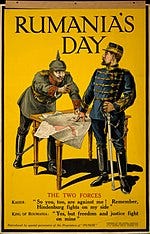My parents were out in the streets during the Romanian 1989 revolution but the first time I ever screamed the name of my country in public was in a US pharmacy that had a red Moneygram phone. “Now I need to know the country you are sending money to,” the robot at the other end of the line said. I proceeded to respond, “Romania”. “Did you say Armenia?” the robot asked again and again while I gradually raised my voice. “RO-MA-NIA” I screamed, tears in my eyes, trying to remember that I should not keep the receiver too close to my face or lips. I was ashamed of the shoppers and pharmacy staff because my intuition told me that upon hearing me scream Romania, they must have realized that they didn’t know much about the country.
Today is Romania’s national holiday that marks the unification, in 1918, of the Kingdom of Romania and the formerly occupied territories of Transylvania, Bessarabia, and Bukovina. This holiday is pretty recent: it was only voted into law in July 1990. When I was growing up, the national holiday was on August 23rd, not December 1st. In fact, I was born in Arad—not Lipova where my family lived—because my mother went into labor on August 23rd. Since it was a national holiday, the only ob-gyn on call was inebriated so she had to change plans, hop into my uncle’s car and drive to Arad, the county capital. When I was in kindergarten, my parents pulled me out of the communist holiday festivities at least once (after letting me prepare for stadium synchronized flag-waving) under the pretext that they were organizing my birthday party in the countryside. I am the third generation to witness the change of the Romanian national holiday: when my grandparents were young, the national holiday was May 10th (between 1866 - 1947) and it commemorated the crowning of King Carol I of Sigmaringen-Hohenzollern. There are three different modern Romanian states (the monarchy that at some point co-existed with a fascist regime, the communist regime, and the post-socialist/democratic one) and in the following weeks, I am going to look at Romanian literature under each of these regimes. I will map out the translated books to each period, make a wishlist of books I hope will get translated next, and try to think through a couple of thoughts I have about translating a book too late (I think Magda Carneci’s FEM is such an example).
Despite my name (Patri) and my nickname from childhood (Patrioata), I am not patriotic and this newsletter or me trying to convince anyone to read Romanian literature is not done out of love for my country. I am so irony-pilled that I don’t think I will ever be truly patriotic. This newsletter was born out of my failed attempt to start a career in publishing after getting a grad degree in comp lit (my stint at a publishing house was delayed and then canceled because of the pandemic). It was born out of an annoying feeling of invisibility that nagged me while living in the US. It was born out of my propensity for spreadsheets. I felt like I have a dog in this fight and the right experience to effectively promote Romanian literature abroad. Something pretty big almost materialized this year but then fell through at the end of September. I was in advanced conversations with the team of editors at a cultural journal in Romania to work on a docu-series pilot about Romanian literature in translation (think Page One). Anyway, I have a couple of other things in the works so let’s see how those play out. You absolutely do not have to “watch this space” because this is a super small newsletter and not where these things will happen (if they do come thru). But send a good thought if you can and want to! Ok, ceau!



